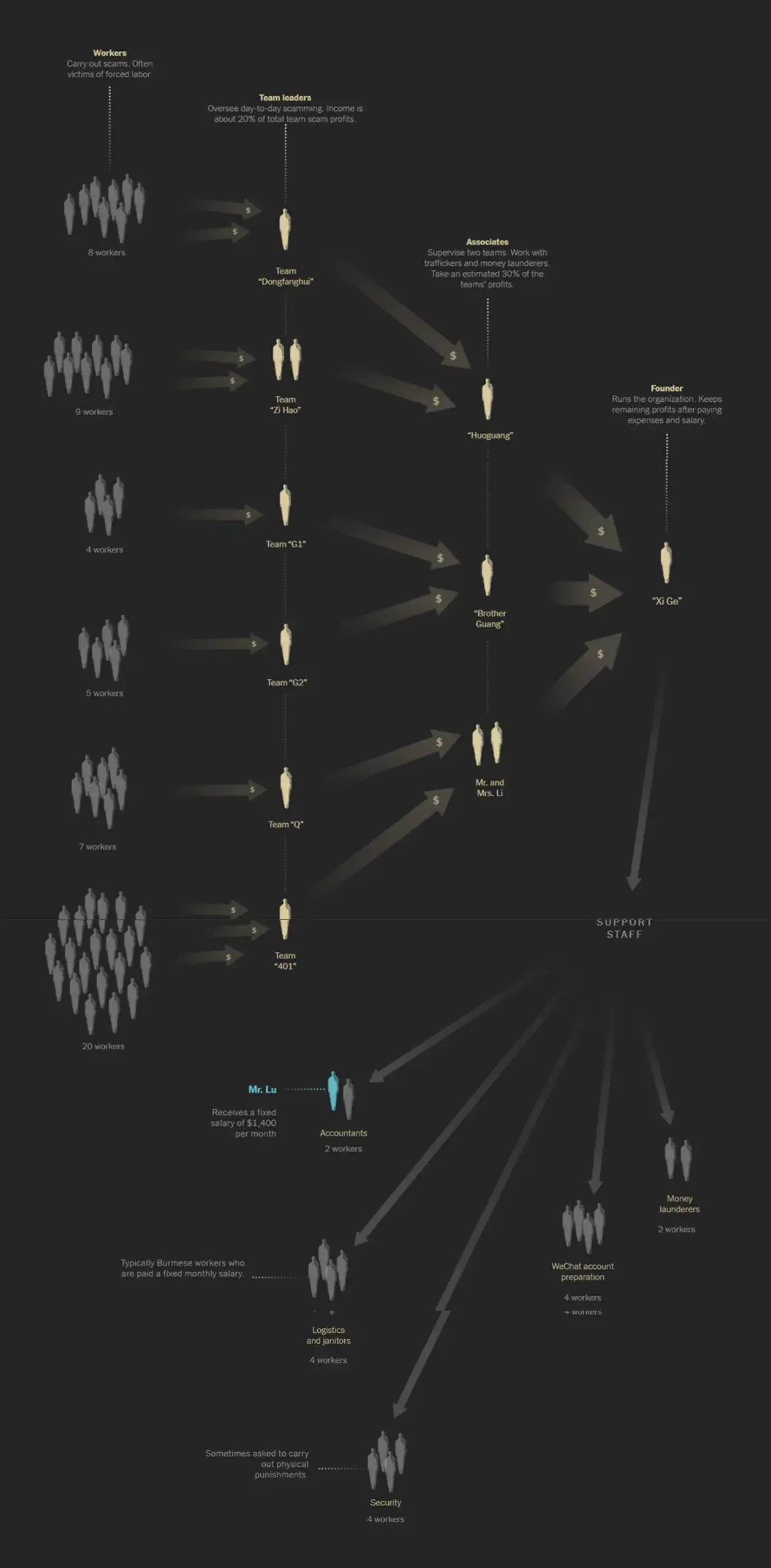密码保护:7 Months Inside an Online Scam Labor Camp 2023.12.17 ☑Press ☑U.S.,美国
A man was abducted by a Chinese gang and forced to work in a scam operation. He gathered financial information, photos and videos and shared the material.
HE HAD BEEN PROMISED a generous salary. A better work-life balance. A chance to live in the vibrant metropolis of Bangkok. His fluency in English would be put to good use as a translator for an e-commerce company, the recruiter had said.
More than anything else, Neo Lu, a 28-year-old Chinese office worker, believed the gig would be the new start he needed to save money for his dream of emigrating to the West. So in June of last year, he said his goodbyes, flew to Thailand and headed for his new job.
But when he arrived, his head was spinning from the scorching sun — and the feeling that something was very wrong. Instead of an office building in a city, Mr. Lu had been dumped at what looked like a labor camp haphazardly built on a patch of jungle and muddy fields.
Within the compound were spartan, low-rise concrete buildings with barred windows and doors. Two men in combat fatigues, carrying rifles, guarded the main entrance. High walls and fences topped with razor wire surrounded the compound, clearly meant to keep not only outsiders at bay, but also those inside from leaving.
As Mr. Lu quickly realized, there was, in fact, no translation job. No e-commerce company, either. It had all been part of a ruse, starting with a posting on a Chinese job forum, perfected by human traffickers to get people like him to travel to Thailand.
The traffickers had led Mr. Lu across the Moei River, a muddy waterway on Thailand’s porous border, and smuggled him, without his knowledge, into a remote corner of Myanmar. There, they handed him over to a Chinese gang that had paid for him.
Mr. Lu had essentially been abducted and sold into a criminal enterprise, far away from everything he knew.
That was how he became one of hundreds of thousands of people who have been trafficked into criminal gangs and trapped in what one research group has called a “criminal cancer” of exploitation, violence and fraud that has taken root in Southeast Asia’s poorest nations.
Mr. Lu, who goes by the nickname Neo for the character in the Matrix movies, spoke to The New York Times on the condition that his full name not be used, for fear of retribution from the criminals. The Times verified the details of his travel, captivity and eventual rescue by interviewing his parents and two friends, as well as by reviewing text messages, copies of travel documents and letters issued by Chinese authorities.
His account of being trafficked aligns with those of many others who have been rescued from such camps. Taken together, his experience and the material he was able to smuggle out are a rare window into the inner workings and tactics of an underworld that is operating on a staggering scale.
From bases in Cambodia, Laos and Myanmar, the gangs coerce their captives into carrying out complicated online scams that prey on the lonely and vulnerable around the world. Typically, such hoaxes involve using fake online identities to draw people into fictitious romantic relationships, then tricking them into handing over large sums of money in bogus cryptocurrency schemes.
➤在网络诈骗劳改营里的7个月
一名男子被中国团伙绑架并被迫在一个诈骗组织工作。他收集了财务信息、照片和视频,并分享了这些材料。
他曾被许诺丰厚的薪水、更好的工作与生活平衡、有机会住在充满活力的曼谷大都市。招聘人员表示,作为一家电子商务公司的翻译,他流利的英语将得到很好的利用。
最重要的是,28 岁的中国浙江台州上班族 Neo Lu(卢)相信这份工作将是他为移民梦想攒钱所需的新起点。于是,去年6月,他飞往泰国,前往新的工作岗位。
但当他到达时,他的头因烈日而晕眩,并感觉有些事情非常不对劲。卢先生被扔到的不是城市的办公楼,而是一片丛林和泥泞的田野上随意搭建的一个看起来像劳改营的地方。
院落内是简朴的低层混凝土建筑,门窗都装有铁栅栏。两名身着作战服、手持步枪的男子守卫着正门。高墙和顶部布满铁丝网的栅栏包围了大院,显然不仅是为了阻止外人进入,也是为了阻止里面的人离开。
卢先生的昵称来自《黑客帝国》电影主角Neo(尼奥),他接受采访时要求不透露自己的全名,因为担心遭到犯罪分子的报复。记者通过采访他的父母和两名朋友,并查看了中国当局签发的短信、旅行证件副本和信件,核实了他的旅行、被囚禁和最终获救的细节。
他对被贩运的描述与许多其他从此类营地获救的人的描述一致。总而言之,他的经验和他能够离开诈骗营的材料是了解规模惊人的黑社会内部运作和策略的难得窗口。
➤附:2023.3.25 ☑媒体报道(国内) 中国留学生被绑至缅甸从事电信诈骗:能活着回国就是万幸
张浩(化名)曾是英国利物浦大学的留学生,2022年6月,他成功应聘泰国一家跨境电商公司的翻译岗位,在抵达泰国后他才意识到,自己早已沦为缅甸电信诈骗集团的俎上肉——他被骗子带至泰缅边境后偷渡,以20万的价格转手卖给了缅甸妙瓦底的一家电信诈骗公司。张浩的记忆里,那是一个让人不寒而栗的地方,一个不见天日的“犯罪天堂”。

in
评论